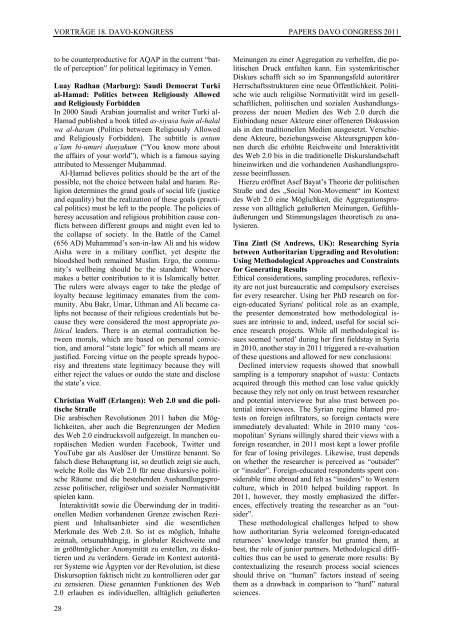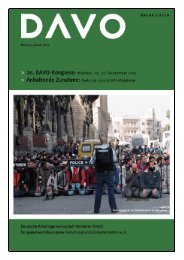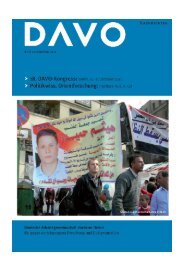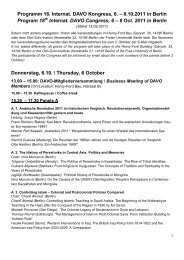4 Dissertationen und Habilita- tionen / Dissertations and Habilitations
4 Dissertationen und Habilita- tionen / Dissertations and Habilitations
4 Dissertationen und Habilita- tionen / Dissertations and Habilitations
Erfolgreiche ePaper selbst erstellen
Machen Sie aus Ihren PDF Publikationen ein blätterbares Flipbook mit unserer einzigartigen Google optimierten e-Paper Software.
VORTRÄGE 18. DAVO-KONGRESS PAPERS DAVO CONGRESS 2011<br />
to be counterproductive for AQAP in the current “battle<br />
of perception” for political legitimacy in Yemen.<br />
Luay Radhan (Marburg): Saudi Democrat Turki<br />
al-Hamad: Politics between Religiously Allowed<br />
<strong>and</strong> Religiously Forbidden<br />
In 2000 Saudi Arabian journalist <strong>and</strong> writer Turki al-<br />
Hamad published a book titled as-siyasa bain al-halal<br />
wa al-haram (Politics between Religiously Allowed<br />
<strong>and</strong> Religiously Forbidden). The subtitle is antum<br />
a´lam bi-umuri dunyakum (“You know more about<br />
the affairs of your world”), which is a famous saying<br />
attributed to Messenger Muḥammad.<br />
Al-Ḥamad believes politics should be the art of the<br />
possible, not the choice between halal <strong>and</strong> haram. Religion<br />
determines the gr<strong>and</strong> goals of social life (justice<br />
<strong>and</strong> equality) but the realization of these goals (practical<br />
politics) must be left to the people. The policies of<br />
heresy accusation <strong>and</strong> religious prohibition cause conflicts<br />
between different groups <strong>and</strong> might even led to<br />
the collapse of society. In the Battle of the Camel<br />
(656 AD) Muhammad’s son-in-law Ali <strong>and</strong> his widow<br />
Aisha were in a military conflict, yet despite the<br />
bloodshed both remained Muslim. Ergo, the community’s<br />
wellbeing should be the st<strong>and</strong>ard: Whoever<br />
makes a better contribution to it is Islamically better.<br />
The rulers were always eager to take the pledge of<br />
loyalty because legitimacy emanates from the community.<br />
Abu Bakr, Umar, Uthman <strong>and</strong> Ali became caliphs<br />
not because of their religious credentials but because<br />
they were considered the most appropriate political<br />
leaders. There is an eternal contradiction between<br />
morals, which are based on personal conviction,<br />
<strong>and</strong> amoral “state logic” for which all means are<br />
justified. Forcing virtue on the people spreads hypocrisy<br />
<strong>and</strong> threatens state legitimacy because they will<br />
either reject the values or outdo the state <strong>and</strong> disclose<br />
the state’s vice.<br />
Christian Wolff (Erlangen): Web 2.0 <strong>und</strong> die politische<br />
Straße<br />
Die arabischen Revolu<strong>tionen</strong> 2011 haben die Möglichkeiten,<br />
aber auch die Begrenzungen der Medien<br />
des Web 2.0 eindrucksvoll aufgezeigt. In manchen europäischen<br />
Medien wurden Facebook, Twitter <strong>und</strong><br />
YouTube gar als Auslöser der Umstürze benannt. So<br />
falsch diese Behauptung ist, so deutlich zeigt sie auch,<br />
welche Rolle das Web 2.0 für neue diskursive politische<br />
Räume <strong>und</strong> die bestehenden Aush<strong>and</strong>lungsprozesse<br />
politischer, religiöser <strong>und</strong> sozialer Normativität<br />
spielen kann.<br />
Interaktivität sowie die Überwindung der in traditionellen<br />
Medien vorh<strong>and</strong>enen Grenze zwischen Rezipient<br />
<strong>und</strong> Inhaltsanbieter sind die wesentlichen<br />
Merkmale des Web 2.0. So ist es möglich, Inhalte<br />
zeitnah, ortsunabhängig, in globaler Reichweite <strong>und</strong><br />
in größtmöglicher Anonymität zu erstellen, zu diskutieren<br />
<strong>und</strong> zu verändern. Gerade im Kontext autoritärer<br />
Systeme wie Ägypten vor der Revolution, ist diese<br />
Diskursoption faktisch nicht zu kontrollieren oder gar<br />
zu zensieren. Diese genannten Funk<strong>tionen</strong> des Web<br />
2.0 erlauben es individuellen, alltäglich geäußerten<br />
28<br />
Meinungen zu einer Aggregation zu verhelfen, die politischen<br />
Druck entfalten kann. Ein systemkritischer<br />
Diskurs schafft sich so im Spannungsfeld autoritärer<br />
Herrschaftsstrukturen eine neue Öffentlichkeit. Politische<br />
wie auch religiöse Normativität wird im gesellschaftlichen,<br />
politischen <strong>und</strong> sozialen Aush<strong>and</strong>lungsprozess<br />
der neuen Medien des Web 2.0 durch die<br />
Einbindung neuer Akteure einer offeneren Diskussion<br />
als in den traditionellen Medien ausgesetzt. Verschiedene<br />
Akteure, beziehungsweise Akteursgruppen können<br />
durch die erhöhte Reichweite <strong>und</strong> Interaktivität<br />
des Web 2.0 bis in die traditionelle Diskursl<strong>and</strong>schaft<br />
hineinwirken <strong>und</strong> die vorh<strong>and</strong>enen Aush<strong>and</strong>lungsprozesse<br />
beeinflussen.<br />
Hierzu eröffnet Asef Bayat’s Theorie der politischen<br />
Straße <strong>und</strong> des „Social Non-Movement“ im Kontext<br />
des Web 2.0 eine Möglichkeit, die Aggregationsprozesse<br />
von alltäglich geäußerten Meinungen, Gefühlsäußerungen<br />
<strong>und</strong> Stimmungslagen theoretisch zu analysieren.<br />
Tina Zintl (St Andrews, UK): Researching Syria<br />
between Authoritarian Upgrading <strong>and</strong> Revolution:<br />
Using Methodological Approaches <strong>and</strong> Constraints<br />
for Generating Results<br />
Ethical considerations, sampling procedures, reflexivity<br />
are not just bureaucratic <strong>and</strong> compulsory exercises<br />
for every researcher. Using her PhD research on foreign-educated<br />
Syrians' political role as an example,<br />
the presenter demonstrated how methodological issues<br />
are intrinsic to <strong>and</strong>, indeed, useful for social science<br />
research projects. While all methodological issues<br />
seemed ‘sorted’ during her first fieldstay in Syria<br />
in 2010, another stay in 2011 triggered a re-evaluation<br />
of these questions <strong>and</strong> allowed for new conclusions:<br />
Declined interview requests showed that snowball<br />
sampling is a temporary snapshot of wasta: Contacts<br />
acquired through this method can lose value quickly<br />
because they rely not only on trust between researcher<br />
<strong>and</strong> potential interviewee but also trust between potential<br />
interviewees. The Syrian regime blamed protests<br />
on foreign infiltrators, so foreign contacts were<br />
immediately devaluated: While in 2010 many ‘cosmopolitan’<br />
Syrians willingly shared their views with a<br />
foreign researcher, in 2011 most kept a lower profile<br />
for fear of losing privileges. Likewise, trust depends<br />
on whether the researcher is perceived as “outsider”<br />
or “insider”. Foreign-educated respondents spent considerable<br />
time abroad <strong>and</strong> felt as “insiders” to Western<br />
culture, which in 2010 helped building rapport. In<br />
2011, however, they mostly emphasized the differences,<br />
effectively treating the researcher as an “outsider”.<br />
These methodological challenges helped to show<br />
how authoritarian Syria welcomed foreign-educated<br />
returnees’ knowledge transfer but granted them, at<br />
best, the role of junior partners. Methodological difficulties<br />
thus can be used to generate more results: By<br />
contextualizing the research process social sciences<br />
should thrive on “human” factors instead of seeing<br />
them as a drawback in comparison to “hard” natural<br />
sciences.





